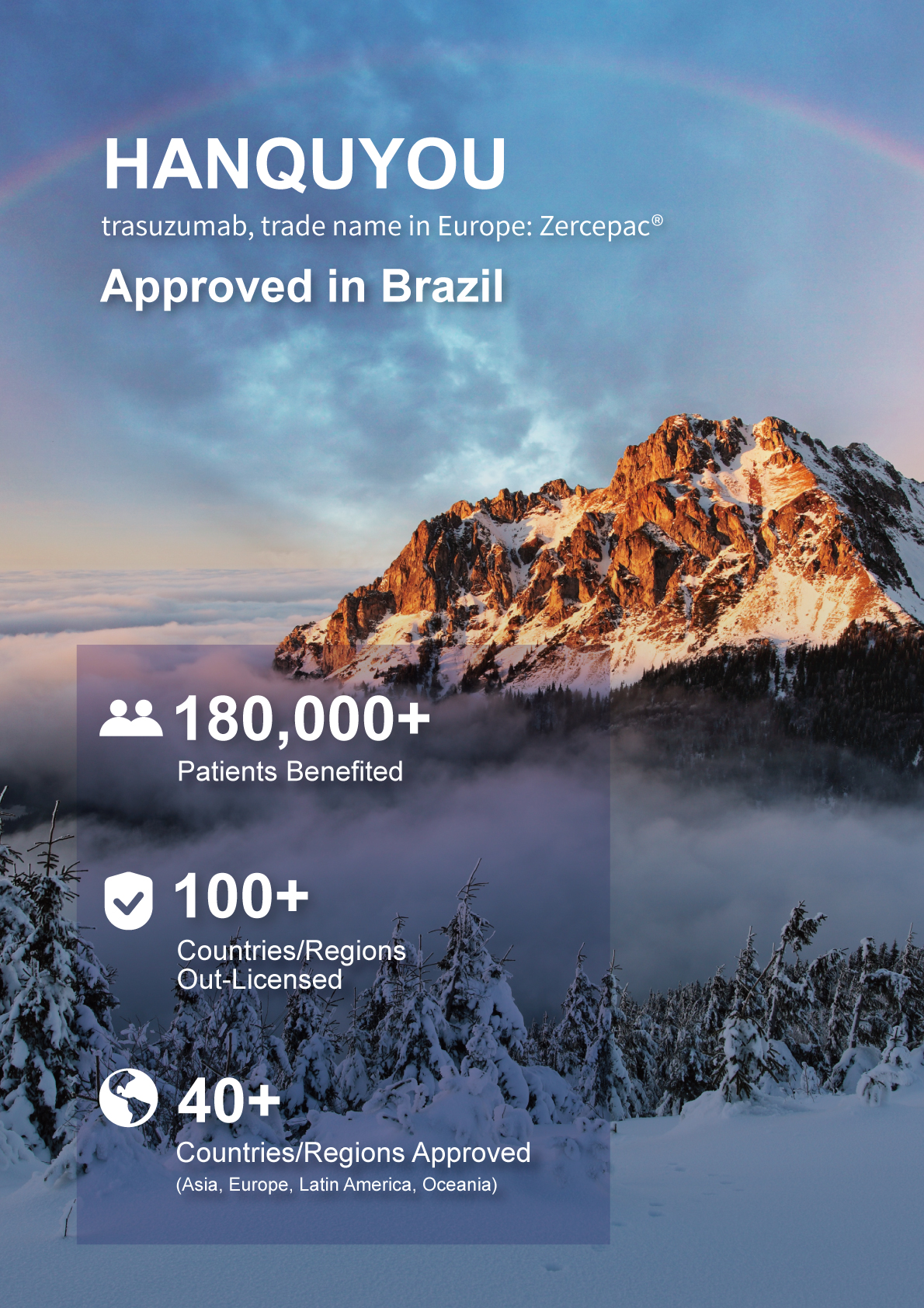-
HANQUYOU has benefited more than 180,000 patients and its out-licensing covers over 100 countries and regions -
- HANQUYOU has been approved in more than 40 countries and regions, reaching Asia, Europe, Latin America, and Oceania -
Recently, HANQUYOU (trastuzumab, trade name in Europe: Zercepac®), independently developed and manufactured by Henlius, has been approved to be marketed in Brazil for the treatment of HER2-positive breast cancer and gastric cancer. To date, the product has been approved for marketing in more than 40 countries and regions worldwide. Following the commercialization of HANQUYOU in Argentina, the approval of HANQUYOU in Brazil, the largest economy and the most populous country in Latin America, has become another anchor point for Henlius' continuous global commercial expansion.

Latin America and the Caribbean comprises 33 countries and regions with a total population of close to 660 million as of 2022 and a per capita GDP of close to $10,000 per capita [1]. In Latin America, breast and gastric cancers are the most and fifth most prevalent malignancies, respectively. The total number of new cases of breast and gastric cancer in the region in 2022 was close to 300,000 [2]. Globally, about 15% to 20% of breast tumours are HER2-positive breast cancers [3]. On the other hand, the reported rates of HER2 positivity in patients with gastric cancer range from 12% to 23% [4]. Trastuzumab has long been a cornerstone of therapy for the treatment of HER2-positive breast and gastric cancers, and has been included as a first-line treatment option in the National Comprehensive Cancer Network (NCCN) guidelines, the Chinese Society of Clinical Oncology (CSCO) guidelines, and the European Society of Medical Oncology (ESMO) guidelines [5-10].
Henlius independently developed HANQUYOU in accordance with the National Medical Products Administration (NMPA), the European Medicines Agency (EMA), the U.S. Food and Drug Administration (FDA) and other international biosimilar guidelines. It was approved for commercialisation by the European Commission (EC) and NMPA in July 2020 and August 2020, respectively. Since its approval, HANQUYOU has been successfully approved in more than 40 countries and regions, including China, the United Kingdom, France, Germany, Switzerland, Australia, Finland, Spain, Argentina, Saudi Arabia, Singapore, Thailand, the Philippines, etc., covering Asia, Europe, Latin America, and Oceania. To date, HANQUYOU has benefited more than 180,000 patients. At present, its marketing applications in the United States (U.S) and Canada have been accepted for review and are expected to be approved in 2024. It is expected to be the first China-developed biosimilar approved in China, Europe, and the U.S.
The manufacturing facilities for HANQUYOU and the quality management system are in line with global standards and have obtained Good Manufacturing Practice (GMP) certifications from China and the EU. Also, the facility has successfully passed the on-site inspections and audits conducted by the NMPA, the EMA, the Brazilian National Health Surveillance Agency (ANVISA), and multiple international business partners and received the Pre-licencing Inspection (PLI) conducted by the U.S. FDA in 2023. A total commercial capacity of 48,000 Liters allows the company to supply products stably to markets beyond China, including Europe, Southeast Asia and Latin America. The company is also continuing to expand its total commercial capacity to address the ever-increasing global market needs.
Henlius has aggressively pursued international commercialisation of HANQUYOU, actively collaborating with global partners such as Accord Healthcare, Abbott, Eurofarma, Elea and KGbio to bring its therapeutics to patients in the U.S., Europe, and other emerging markets, covering over 100 countries and regions. In the future, Henlius will continue to promote the approval and launch of HANQUYOU in more countries and regions to accelerate the delivery of high-quality, affordable, and innovative medicines to patients worldwide.
【References】
[1] World Bank. "GDP per capita (current US$)." & "Population, total", World Development Indicators. The World Bank Group
[2] Ferlay J, Ervik M, Lam F, Laversanne M, Colombet M, Mery L, Piñeros M, Znaor A, Soerjomataram I, Bray F (2020). Global Cancer Observatory: Cancer Today. Lyon, France: International Agency for Research on Cancer. Available from: https://gco.iarc.who.int/today, accessed [29 January 2024]
[3] American Cancer Society. Cancer Facts and Figures 2024. Atlanta: American Cancer Society; 2024.
[4] NCCN Clinical Practice Guidelines in Oncology (NCCN Guidelines®) for Gastric Cancer V.3.2023
[5] NCCN Clinical Practice Guidelines in Oncology (NCCN Guidelines®) for Breast Cancer V.1.2024
[6] Loibl S, André F, Bachelot T, et al. Early breast cancer: ESMO Clinical Practice Guideline for diagnosis, treatment and follow-up. Ann Oncol. 2024;35(2):159-182. doi:10.1016/j.annonc.2023.11.016
[7] Gennari A, André F, Barrios CH, et al. ESMO Clinical Practice Guideline for the diagnosis, staging and treatment of patients with metastatic breast cancer. Ann Oncol. 2021;32(12):1475-1495. doi:10.1016/j.annonc.2021.09.019
[8] Gennari A, André F, Barrios CH, et al. ESMO Clinical Practice Guideline for the diagnosis, staging and treatment of patients with metastatic breast cancer. Ann Oncol. 2021;32(12):1475-1495. doi:10.1016/j.annonc.2021.09.019
[9] Chinese Society of Clinical Oncology (CSCO) Breast Cancer Guidelines 2023
[10] Chinese Society of Clinical Oncology (CSCO) Gastric Cancer Guidelines 2023
